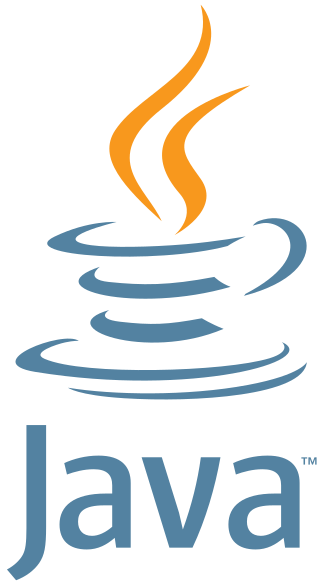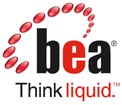
Java is a high-level, class-based, object-oriented programming language that is designed to have as few implementation dependencies as possible. It is a general-purpose programming language intended to let programmers write once, run anywhere (WORA), meaning that compiled Java code can run on all platforms that support Java without the need to recompile. Java applications are typically compiled to bytecode that can run on any Java virtual machine (JVM) regardless of the underlying computer architecture. The syntax of Java is similar to C and C++, but has fewer low-level facilities than either of them. The Java runtime provides dynamic capabilities that are typically not available in traditional compiled languages. As of 2019, Java was one of the most popular programming languages in use according to GitHub, particularly for client–server web applications, with a reported 9 million developers.

A Java virtual machine (JVM) is a virtual machine that enables a computer to run Java programs as well as programs written in other languages that are also compiled to Java bytecode. The JVM is detailed by a specification that formally describes what is required in a JVM implementation. Having a specification ensures interoperability of Java programs across different implementations so that program authors using the Java Development Kit (JDK) need not worry about idiosyncrasies of the underlying hardware platform.

Oracle Corporation is an American multinational computer technology corporation headquartered in Austin, Texas. In 2020, Oracle was the third-largest software company in the world by revenue and market capitalization. The company sells database software and technology, cloud engineered systems, and enterprise software products, such as enterprise resource planning (ERP) software, human capital management (HCM) software, customer relationship management (CRM) software, enterprise performance management (EPM) software, and supply chain management (SCM) software.

Sun Microsystems, Inc. was an American technology company that sold computers, computer components, software, and information technology services and created the Java programming language, the Solaris operating system, ZFS, the Network File System (NFS), and SPARC microprocessors. Sun contributed significantly to the evolution of several key computing technologies, among them Unix, RISC processors, thin client computing, and virtualized computing. Notable Sun acquisitions include Cray Business Systems Division, Storagetek, and Innotek GmbH, creators of VirtualBox. Sun was founded on February 24, 1982. At its height, the Sun headquarters were in Santa Clara, California, on the former west campus of the Agnews Developmental Center.

James Gosling is a Canadian computer scientist, best known as the founder and lead designer behind the Java programming language.

BEA Systems, Inc. was a company that specialized in enterprise infrastructure software products, which was wholly acquired by Oracle Corporation on April 29, 2008.
HotSpot, released as Java HotSpot Performance Engine, is a Java virtual machine for desktop and server computers, developed by Sun Microsystems and now maintained and distributed by Oracle Corporation. It features improved performance via methods such as just-in-time compilation and adaptive optimization.
Apache Harmony is a retired open source, free Java implementation, developed by the Apache Software Foundation. It was announced in early May 2005 and on October 25, 2006, the Board of Directors voted to make Apache Harmony a top-level project. The Harmony project achieved 99% completeness for J2SE 5.0, and 97% for Java SE 6. The Android operating system has historically been a major user of Harmony, although since Android Nougat it increasingly relies on OpenJDK libraries.
JRockit was a proprietary Java virtual machine (JVM) originally developed by Appeal Virtual Machines, acquired by BEA Systems in 2002, and became part of Oracle Fusion Middleware as part of acquisition of BEA Systems in 2008.

Java is a set of computer software and specifications developed by James Gosling at Sun Microsystems, which was later acquired by the Oracle Corporation, that provides a system for developing application software and deploying it in a cross-platform computing environment. Java is used in a wide variety of computing platforms from embedded devices and mobile phones to enterprise servers and supercomputers. Java applets, which are less common than standalone Java applications, were commonly run in secure, sandboxed environments to provide many features of native applications through being embedded in HTML pages.
The Java language has undergone several changes since JDK 1.0 as well as numerous additions of classes and packages to the standard library. Since J2SE 1.4, the evolution of the Java language has been governed by the Java Community Process (JCP), which uses Java Specification Requests (JSRs) to propose and specify additions and changes to the Java platform. The language is specified by the Java Language Specification (JLS); changes to the JLS are managed under JSR 901. In September 2017, Mark Reinhold, chief Architect of the Java Platform, proposed to change the release train to "one feature release every six months" rather than the then-current two-year schedule. This proposal took effect for all following versions, and is still the current release schedule.
OpenJDK is a free and open-source implementation of the Java Platform, Standard Edition. It is the result of an effort Sun Microsystems began in 2006. The implementation is licensed under the GPL-2.0-only with a linking exception. Were it not for the GPL linking exception, components that linked to the Java class library would be subject to the terms of the GPL license. OpenJDK is the official reference implementation of Java SE since version 7.
Dalvik is a discontinued process virtual machine (VM) in the Android operating system that executes applications written for Android. Dalvik was an integral part of the Android software stack in the Android versions 4.4 "KitKat" and earlier, which were commonly used on mobile devices such as mobile phones and tablet computers, and more in some devices such as smart TVs and wearables. Dalvik is open-source software, originally written by Dan Bornstein, who named it after the fishing village of Dalvík in Eyjafjörður, Iceland.

Lars Bak is a Danish computer programmer. He is known as a JavaScript expert and for his work on virtual machines. He previously worked for Google, having contributed to the Chrome browser by developing the V8 JavaScript engine.
Oracle WebLogic Server is a Java EE application server currently developed by Oracle Corporation. Oracle acquired WebLogic Server when it purchased BEA Systems in 2008.

The acquisition of Sun Microsystems by Oracle Corporation was completed on January 27, 2010. After the acquisition was completed, Oracle, only a software vendor prior to the merger, owned Sun's hardware product lines, such as SPARC Enterprise, as well as Sun's software product lines, including the Java programming language.
Google LLC v. Oracle America, Inc., 593 U.S. ___ (2021), was a U.S. Supreme Court decision related to the nature of computer code and copyright law. The dispute centered on the use of parts of the Java programming language's application programming interfaces (APIs) and about 11,000 lines of source code, which are owned by Oracle, within early versions of the Android operating system by Google. Google has since transitioned Android to a copyright-unburdened engine without the source code, and has admitted to using the APIs but claimed this was within fair use.

JDK Mission Control is an open source tools suite for the Java virtual machine. The tools help finding problems in, and optimizing, programs running on the JVM in production. JDK Mission Control supports OpenJDK 11 and Oracle JDK 7u40.
JDK Flight Recorder is an event recorder built into the Java virtual machine. It can be thought of as the software equivalent of a Data Flight Recorder in a commercial aircraft. It captures information about the JVM itself, and the application running in the JVM. There is a wide variety of data captured, for example method profiling, allocation profiling and garbage collection related events. The JDK Flight Recorder was designed to minimize the Observer Effect in the profiled system, and is meant to be always on in production systems. The technology was open sourced in 2018.








